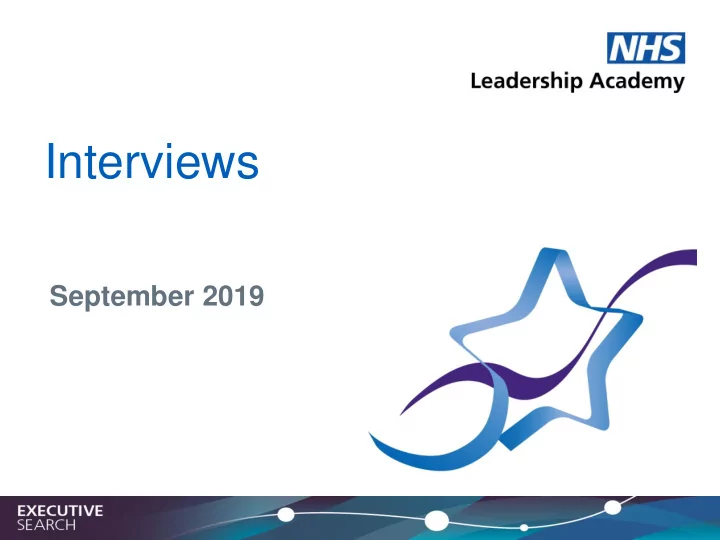

Interviews September 2019
We will cover • Preparing for interview • Types of Interview • Interview Questions • STAR technique • General interview tips
What is the purpose of an interview?
Preparation • Due diligence • Presentation/other tasks etc • Identify key areas and prepare evidence • Summarise challenges and how you can contribute to each • Use the ‘clock technique’ to identify stories/evidence • Practice, practice, practice!
Types of interview Could include: • Formal panel interview (possibly including a presentation) • Series of ‘focus groups’ or ‘sub - panels’ with key people • Informal ‘meet and greet’, perhaps over lunch • Presentation to a group of anywhere up to 30 people • Other ‘assessment’ exercises e.g. case studies • Assessment Centres
The final/panel interview - Questions
Types of questions They could cover almost anything, but likely types of questions include: • The ‘open goal’ first question – personal motivations etc • “Give us an example of…” – what have you done? • “How would you…?” – about doing it in their world • Good questions are ‘open’ & start ‘how/when/where/what’
What are they evaluating • Your technical ability • Your personal competencies – how you get things done • Your values & how you uphold them • Your understanding of their organisation and the role • Your fit to their culture • What you would be like as a colleague • Evidence of self-awareness
STAR Technique • S ituation • T ask • A ction • R esult
How to answer questions: • There’s answering the question, and really answering the question: o S.T.A.R. o Basic level answers o Intermediate level answers o Advanced level answers • View questions not as a threat but as an opportunity
The formal interview – example questions • What motivated you to apply to this role, what will you bring to it? • Tell me about yourself • Describe your communication style • Describe your leadership style • How would colleagues describe you? • If appointed to this post, what would your development needs be?
Tips for the day • Relax – but not too much – it is a formal interview • Be yourself – that’s what they want to see • The panel will be looking for reasons to appoint you, not to reject you • Listen to the question and make sure you answer it • Be enthusiastic & show you want it – don’t be the ‘grey’ candidate • Engage with them all, not just the Chair • Don’t ask something for the sake of it
The origin of job interviews • https://www.youtube.com/watch?v=b56eAUCTLok
If successful need to consider • Is there any need to negotiate on salary, or other terms • Resignation and an agreement regarding end date and start date • Support through transition (think about induction and 1 st 100 days plan) • Medium-long term development needs • NB feedback on your interview performance can still provide valuable learning
If unsuccessful • Accept the decision • Try to get proper and (as much as possible) detailed feedback on your performance from both the hiring line manager and External Assessor • Use the feedback as a basis for reflection and development • Discuss this with your line manager and put a plan in place to address any development needs
Q & A
Recommend
More recommend